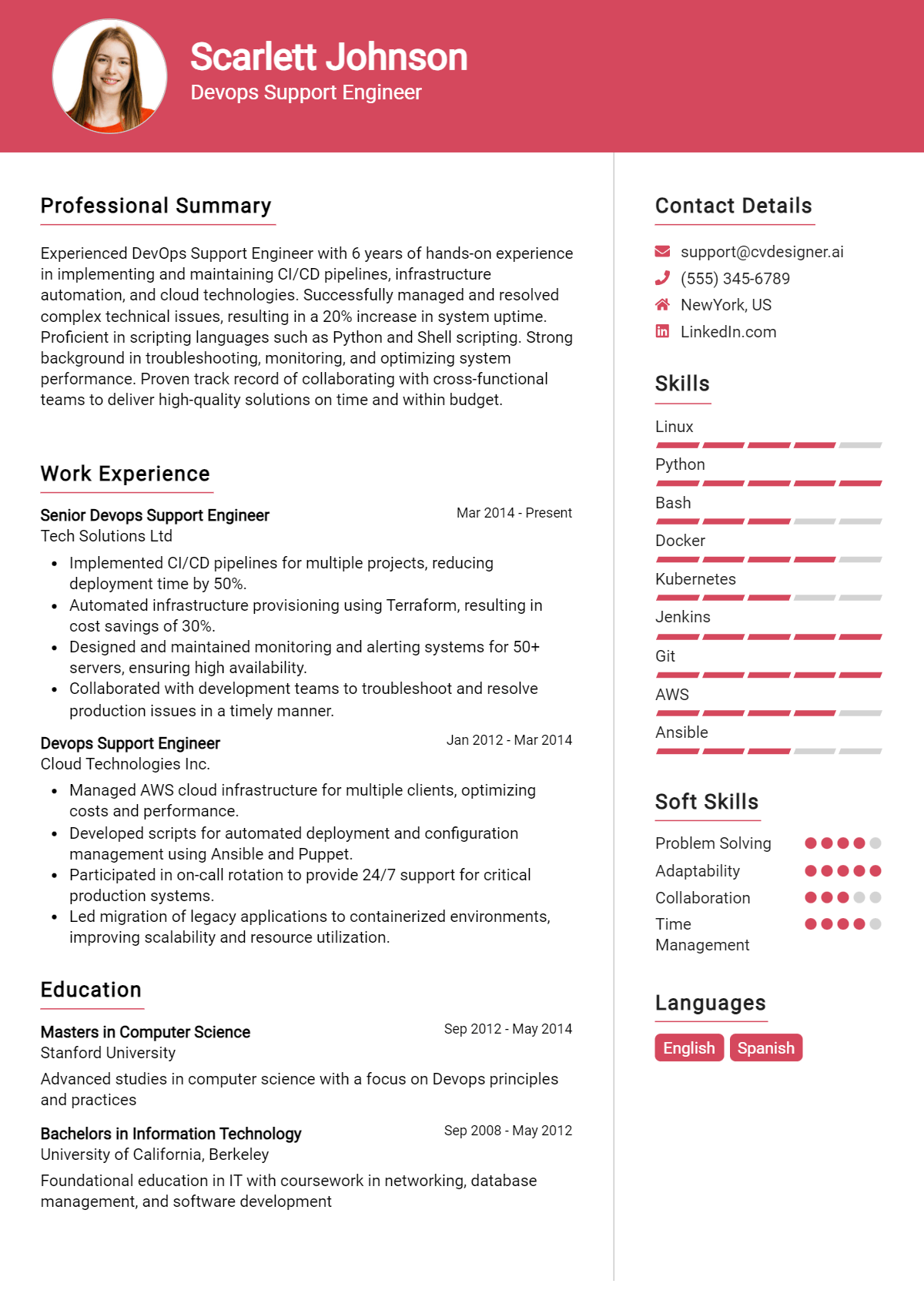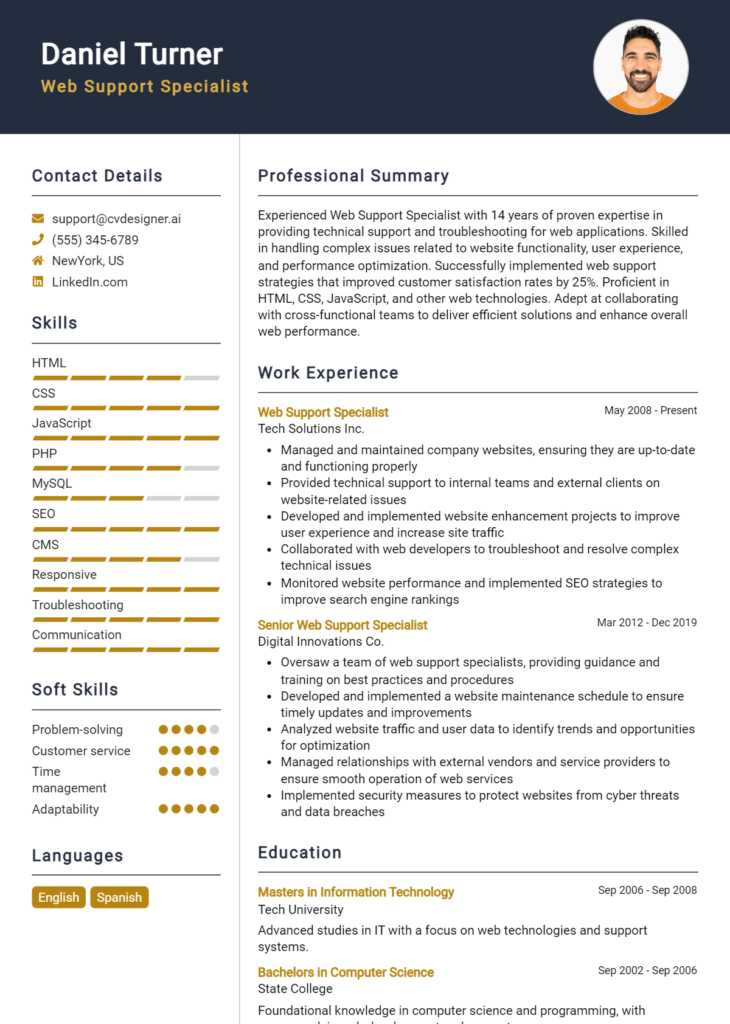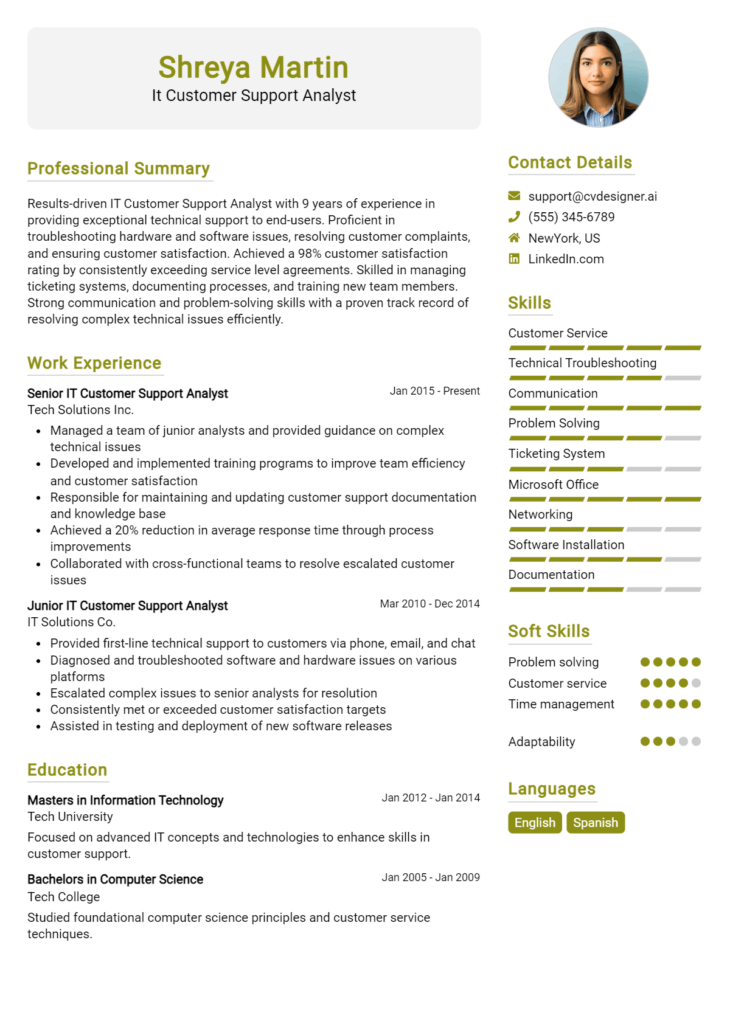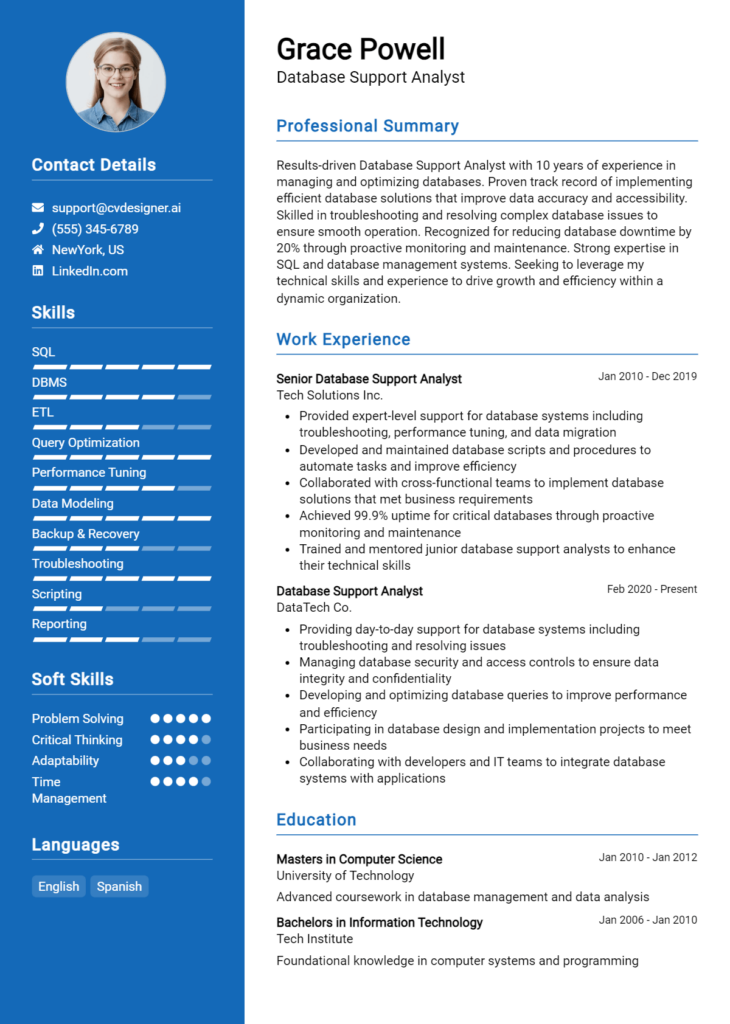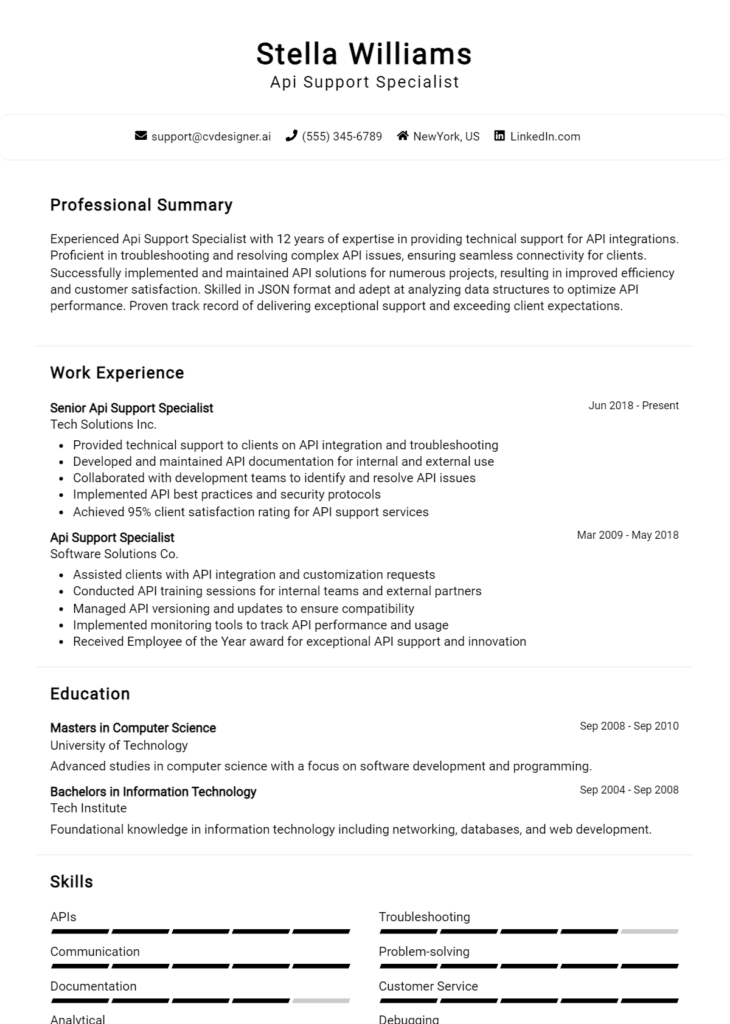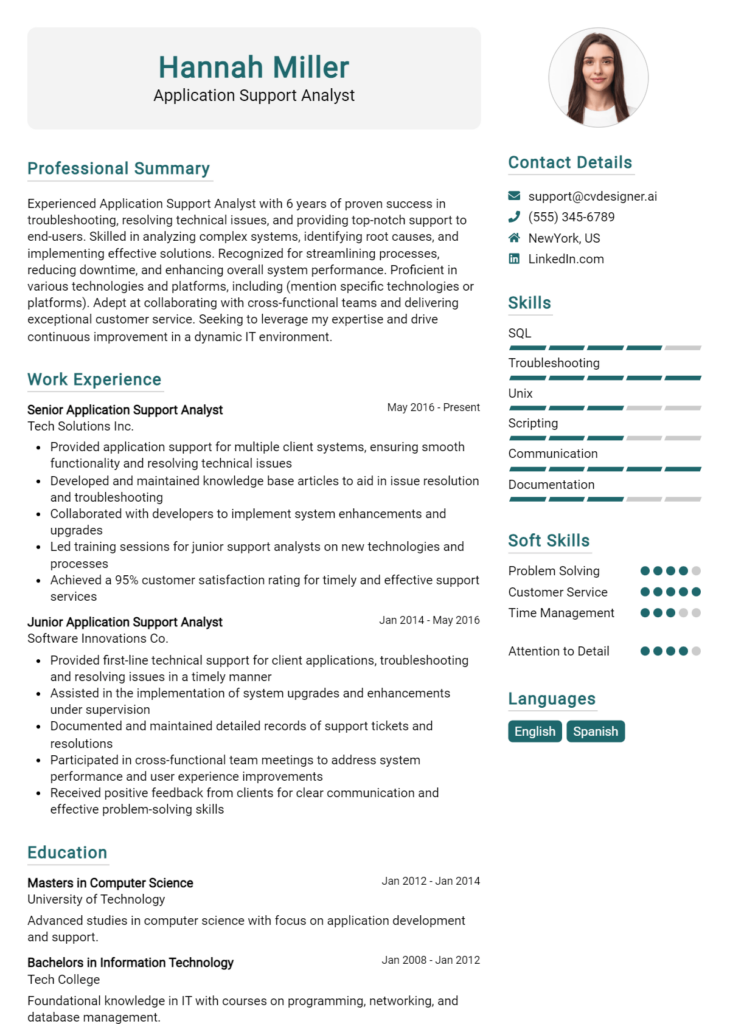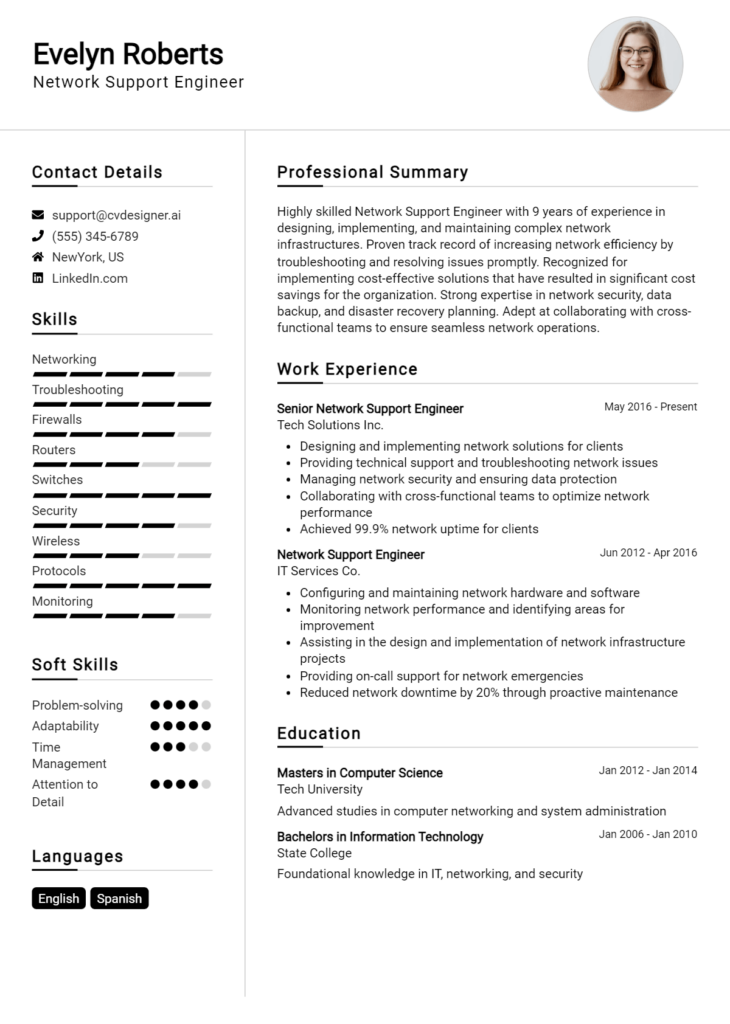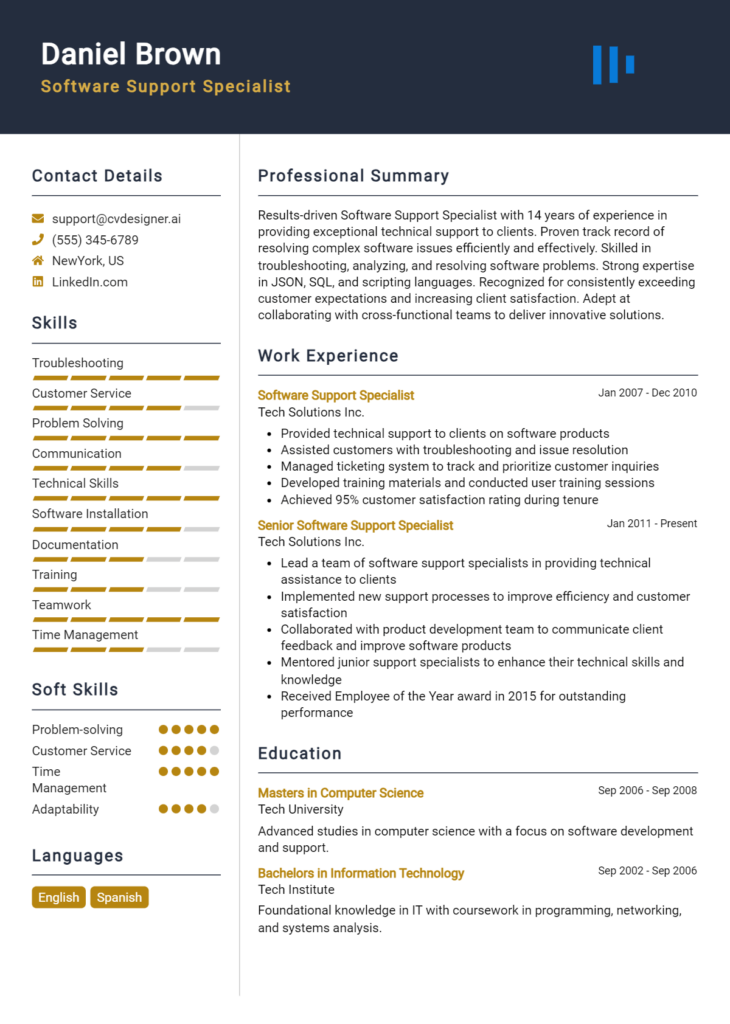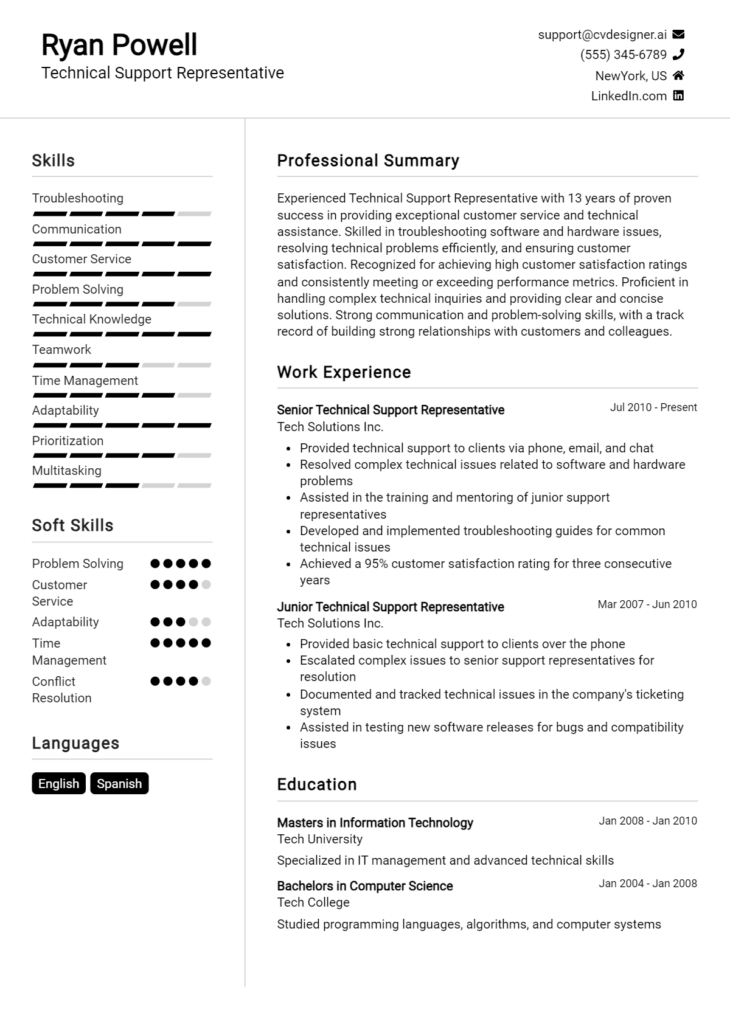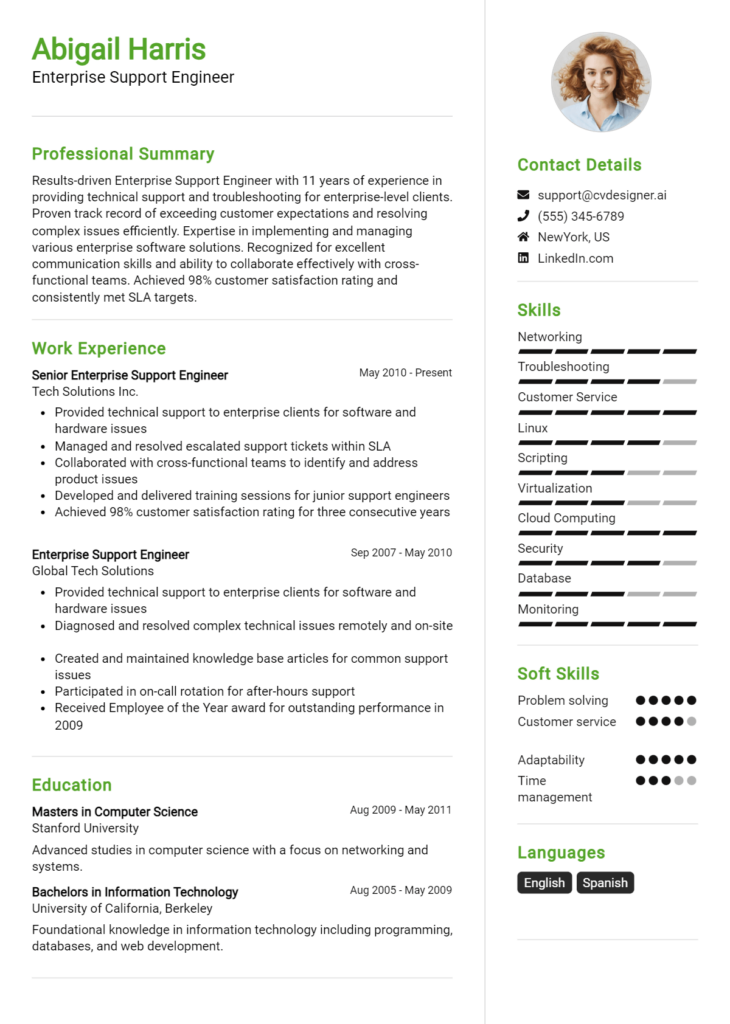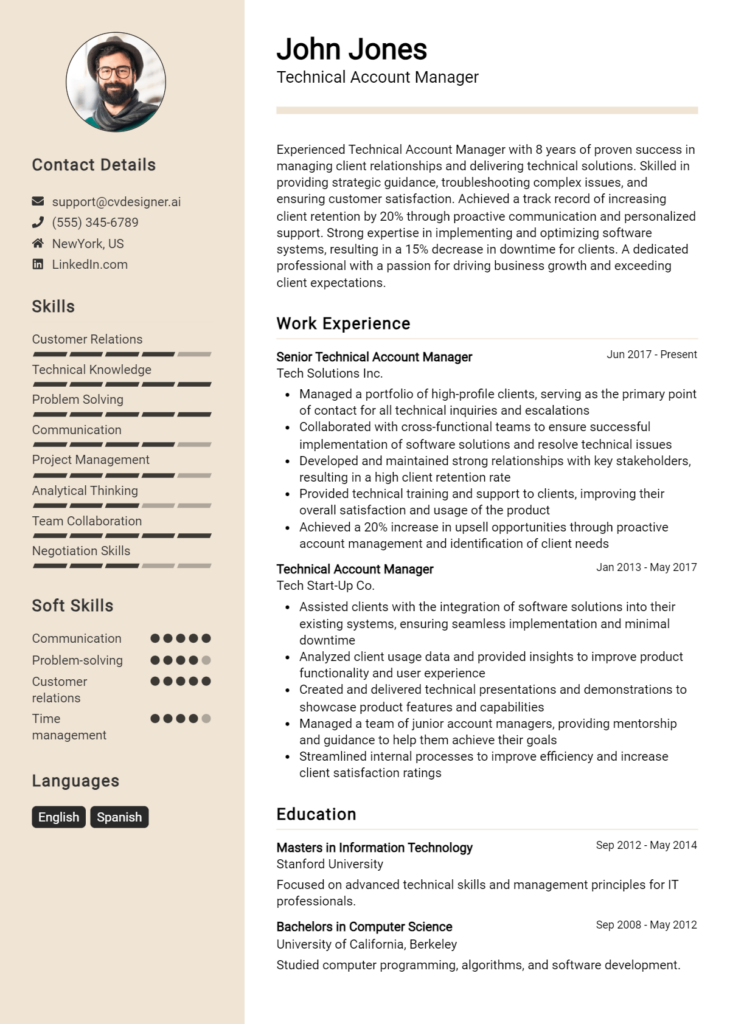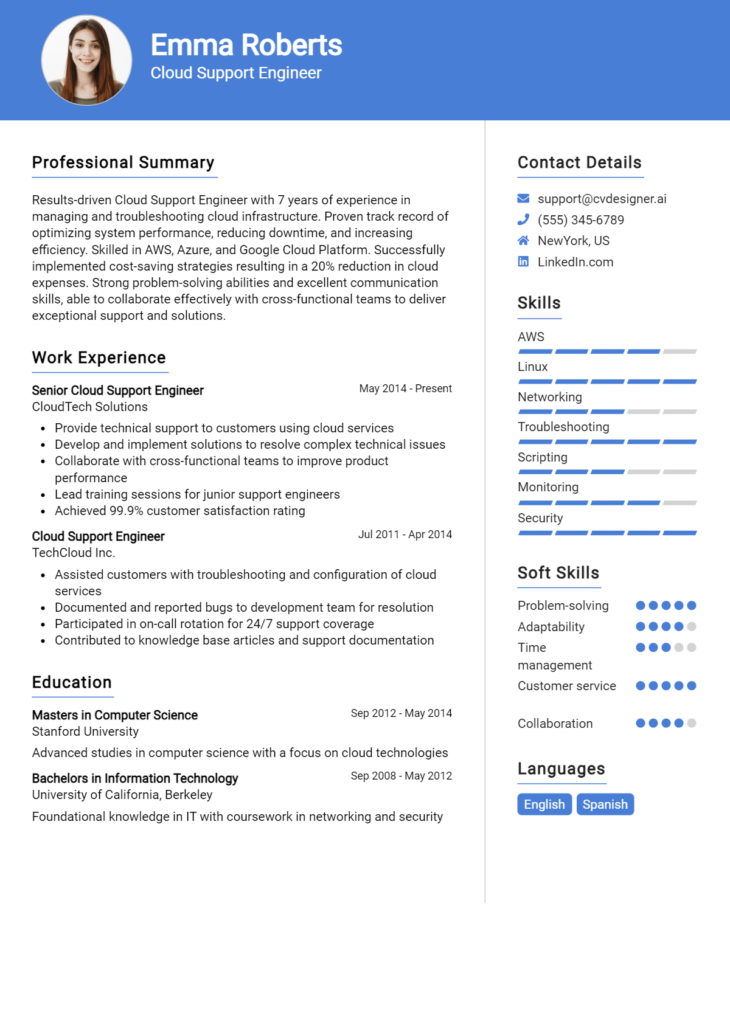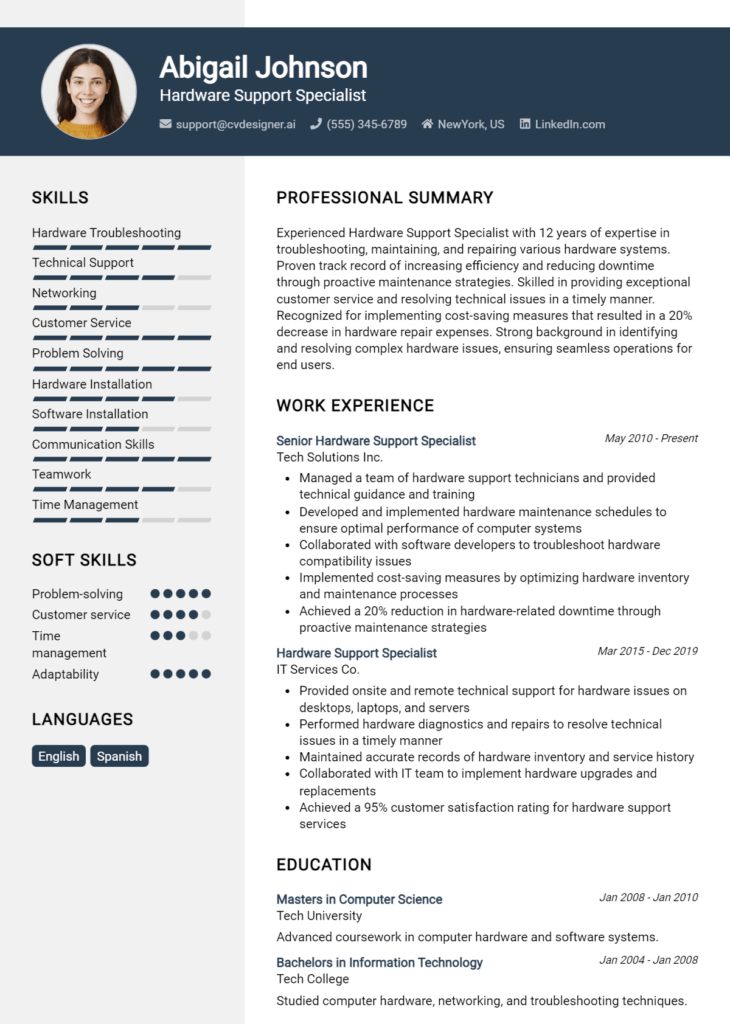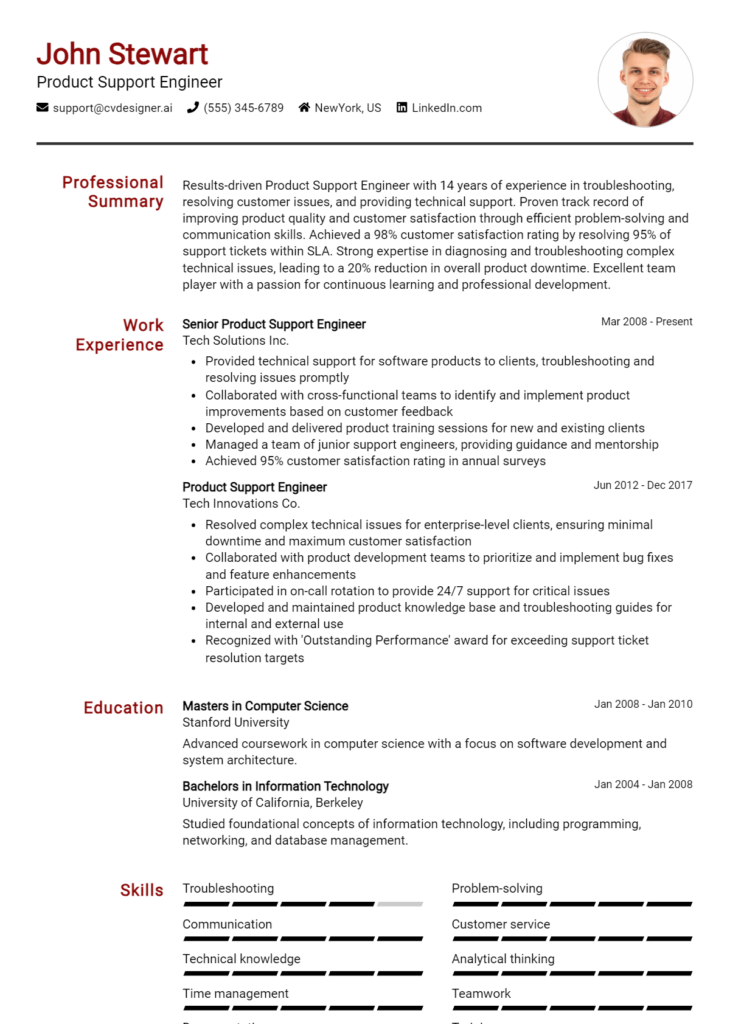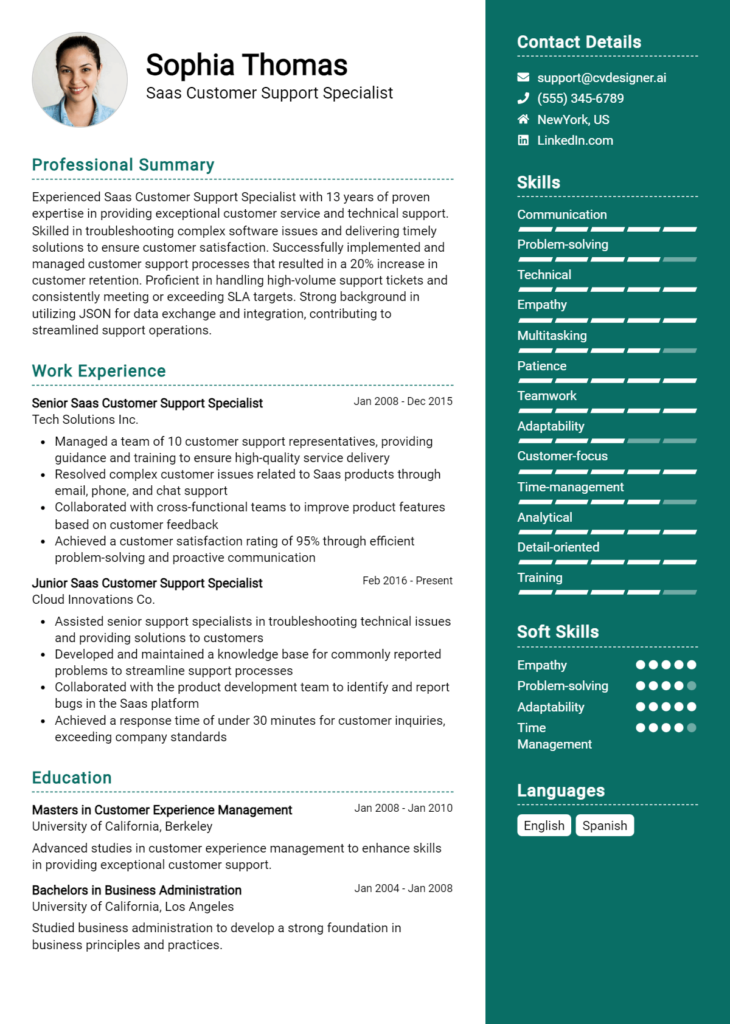DevOps Support Engineer Core Responsibilities
A DevOps Support Engineer plays a crucial role in bridging the gap between development and operations teams by facilitating collaboration and enhancing communication. Key responsibilities include managing CI/CD pipelines, monitoring system performance, and troubleshooting issues across environments. Essential skills encompass technical proficiency in cloud services, scripting, and automation tools, along with strong problem-solving and operational capabilities. These abilities directly contribute to an organization’s efficiency and productivity. A well-structured resume can effectively highlight these qualifications, showcasing the candidate's potential to drive organizational success.
Common Responsibilities Listed on DevOps Support Engineer Resume
- Implementing and managing CI/CD pipelines to streamline software delivery.
- Monitoring system performance and ensuring high availability and reliability.
- Troubleshooting and resolving infrastructure issues across development and production environments.
- Collaborating with development teams to enhance application deployment processes.
- Automating manual processes using scripting and configuration management tools.
- Maintaining system security and compliance standards.
- Conducting root cause analysis for incidents and implementing preventive measures.
- Providing technical support and training to team members and stakeholders.
- Documenting processes, procedures, and system configurations.
- Participating in on-call rotations to ensure 24/7 system support.
- Evaluating and integrating new tools and technologies to improve operations.
- Engaging in performance tuning and optimization of applications and infrastructure.
High-Level Resume Tips for DevOps Support Engineer Professionals
In today's competitive job market, a well-crafted resume is essential for DevOps Support Engineer professionals seeking to make a strong first impression on potential employers. Your resume serves as the initial introduction to your skills and achievements, and it should effectively convey your expertise in software development, systems operations, and collaborative methodologies. A compelling resume not only highlights your technical proficiencies but also showcases your problem-solving abilities and contributions to project success. This guide will provide practical and actionable resume tips specifically tailored for DevOps Support Engineer professionals, ensuring that your application stands out in the crowded field.
Top Resume Tips for DevOps Support Engineer Professionals
- Tailor your resume to match the job description, emphasizing relevant skills and experiences that align with the specific requirements of the position.
- Highlight your technical skills prominently, including proficiency in tools and technologies such as Docker, Kubernetes, Jenkins, AWS, and CI/CD pipelines.
- Showcase relevant experience by listing your previous roles in reverse chronological order, focusing on positions that involved DevOps practices.
- Quantify your achievements by using metrics to illustrate your impact, such as reduced deployment times or improved system uptime.
- Include keywords from the job posting to ensure your resume passes through applicant tracking systems (ATS) effectively.
- Demonstrate your problem-solving capabilities with specific examples of challenges you faced and how you overcame them in a DevOps environment.
- Emphasize teamwork and collaboration, as DevOps relies heavily on cross-functional communication between development and operations teams.
- Incorporate certifications relevant to DevOps, such as AWS Certified DevOps Engineer or Docker Certified Associate, to validate your expertise.
- Utilize a clean and professional format that makes your resume easy to read, with clear headings and bullet points for quick information retrieval.
- Keep your resume concise, ideally one page, focusing on the most relevant experiences and skills to maintain the hiring manager's attention.
By implementing these tips, you can significantly enhance your resume’s effectiveness, increasing your chances of landing a job in the DevOps Support Engineer field. A well-structured and targeted resume not only showcases your qualifications but also demonstrates your understanding of the industry, making you a compelling candidate for potential employers.
Why Resume Headlines & Titles are Important for DevOps Support Engineer
In the competitive field of DevOps, a well-crafted resume headline or title serves as a critical first impression for hiring managers. For a DevOps Support Engineer, this headline acts as a concise summary that encapsulates the candidate's key qualifications and strengths in a single impactful phrase. An effective headline not only grabs attention but also immediately communicates relevance to the role being applied for, making it essential to ensure that it is both concise and directly related to the position. A strong headline can set the tone for the rest of the resume, highlighting a candidate's unique value proposition and increasing the likelihood of securing an interview.
Best Practices for Crafting Resume Headlines for DevOps Support Engineer
- Keep it concise—aim for a single impactful phrase.
- Use role-specific keywords that match the job description.
- Highlight key skills or certifications relevant to DevOps.
- Showcase measurable accomplishments where possible.
- Make it unique to differentiate from other candidates.
- Tailor the headline for each job application to enhance relevance.
- Incorporate action-oriented language to convey dynamism.
- Avoid jargon or overly technical terms that may confuse hiring managers.
Example Resume Headlines for DevOps Support Engineer
Strong Resume Headlines
"Results-Driven DevOps Support Engineer with 5+ Years of Experience in Cloud Infrastructure and Automation."
“Certified DevOps Engineer Specializing in CI/CD Pipelines and System Reliability.”
“Dedicated DevOps Support Engineer with Proven Expertise in Incident Management and Troubleshooting.”
Weak Resume Headlines
“DevOps Engineer Looking for Opportunities.”
“IT Professional with Skills.”
The strong headlines are effective because they clearly articulate the candidate's qualifications, skills, and experience in a way that is tailored to the position, making them immediately relevant to hiring managers. They use specific language that conveys expertise and highlights measurable achievements, which can set the candidate apart. In contrast, the weak headlines lack detail and specificity, making them generic and forgettable. They fail to showcase the candidate's unique strengths or relevance to the role, reducing the chances of making a lasting impression.
Writing an Exceptional DevOps Support Engineer Resume Summary
A well-crafted resume summary is essential for a DevOps Support Engineer, as it serves as the first impression a hiring manager has of a candidate. This concise paragraph quickly captures attention by showcasing key skills, relevant experience, and significant accomplishments that align with the job role. An impactful summary can differentiate a candidate in a competitive job market, effectively highlighting their qualifications and demonstrating their value proposition. It should be succinct, powerful, and tailored specifically to the job description to resonate with hiring managers and draw them into the rest of the resume.
Best Practices for Writing a DevOps Support Engineer Resume Summary
- Quantify achievements: Use numbers to highlight your impact, such as system uptime percentages or project timelines.
- Focus on relevant skills: Emphasize technical skills and tools that are directly related to DevOps practices.
- Tailor the summary: Customize your summary for the specific job you are applying for, reflecting the language used in the job description.
- Keep it concise: Aim for 3-5 sentences that deliver maximum information without being overly verbose.
- Highlight soft skills: Mention key soft skills such as teamwork, communication, and problem-solving that are crucial for a DevOps role.
- Showcase certifications: If you have relevant certifications, include them to add credibility and demonstrate expertise.
- Use action verbs: Start sentences with strong action verbs to convey confidence and proactivity.
- Include industry-related keywords: Use keywords that are relevant to the DevOps field to pass applicant tracking systems (ATS).
Example DevOps Support Engineer Resume Summaries
Strong Resume Summaries
Results-driven DevOps Support Engineer with over 5 years of experience in automating CI/CD pipelines and maintaining system reliability. Achieved a 30% increase in deployment efficiency through the implementation of Docker and Kubernetes.
Detail-oriented DevOps Support Engineer skilled in cloud environments, particularly AWS and Azure, with a proven track record of reducing infrastructure costs by 20% while improving service uptime to 99.9%.
Proactive DevOps Support Engineer with expertise in monitoring and logging tools such as Prometheus and Grafana, contributing to a 40% reduction in incident response time while enhancing team collaboration.
Weak Resume Summaries
Experienced engineer looking for a new opportunity in DevOps support. Good with technology and troubleshooting.
DevOps Support Engineer with some experience in various tools and systems. I am eager to contribute to a team.
The strong resume summaries are effective because they provide quantifiable results, specific skills, and direct relevance to the DevOps role, showcasing the candidate's achievements and expertise. In contrast, the weak summaries lack detail and clarity, failing to demonstrate the candidate's unique qualifications or the impact of their experience, making them less appealing to hiring managers.
Work Experience Section for DevOps Support Engineer Resume
The work experience section of a DevOps Support Engineer resume is crucial as it serves as a key indicator of the candidate's technical skills, ability to manage cross-functional teams, and capacity to deliver high-quality products efficiently. This section not only highlights relevant job experiences but also provides an opportunity to quantify achievements and demonstrate alignment with industry standards. By showcasing specific accomplishments and responsibilities, candidates can effectively communicate their value to potential employers, making it essential to present experiences in a compelling and measurable manner.
Best Practices for DevOps Support Engineer Work Experience
- Highlight relevant technical skills such as cloud services, CI/CD pipelines, and container orchestration.
- Include quantifiable results to demonstrate the impact of your contributions, such as percentage improvements or cost savings.
- Focus on leadership roles and collaborative projects that showcase your ability to work in a team environment.
- Use action verbs to describe your responsibilities and achievements, making them sound proactive and impactful.
- Tailor your experiences to match the specific requirements of the job you are applying for.
- Incorporate industry-specific terminology to align your experience with current trends and standards.
- Emphasize your problem-solving capabilities and any challenges you overcame in previous roles.
- Provide context for your contributions by detailing the scope of the projects undertaken.
Example Work Experiences for DevOps Support Engineer
Strong Experiences
- Led a cross-functional team to implement a CI/CD pipeline, reducing deployment time by 40% and increasing release frequency by 30%.
- Architected and deployed a cloud-based infrastructure that improved system reliability, achieving a 99.9% uptime over 12 months.
- Collaborated with development teams to migrate legacy applications to microservices, resulting in a 50% reduction in resource consumption.
- Implemented monitoring solutions that decreased incident response time by 60%, enhancing overall system performance.
Weak Experiences
- Worked on various IT projects that involved some DevOps tasks.
- Assisted in the deployment of applications without specifying the technologies used or outcomes achieved.
- Participated in team meetings to discuss project updates.
- Helped with troubleshooting issues as they arose, but did not describe the impact or resolution.
The examples provided illustrate the distinction between strong and weak experiences. Strong experiences are characterized by specific, quantifiable achievements, showcasing both technical expertise and leadership abilities. They provide clear evidence of the candidate’s impact within their roles. Conversely, weak experiences lack specificity, fail to convey measurable results, and do not highlight the candidate’s contributions, making it difficult for potential employers to assess their capabilities effectively.
Education and Certifications Section for DevOps Support Engineer Resume
The education and certifications section of a DevOps Support Engineer resume is crucial for demonstrating the candidate's academic background, industry-relevant qualifications, and commitment to continuous learning. This section not only showcases formal education but also highlights specialized certifications and relevant coursework that align with the demands of the DevOps field. By providing specific details about their educational achievements and certifications, candidates can significantly enhance their credibility and show potential employers that they possess the knowledge and skills necessary for success in the role.
Best Practices for DevOps Support Engineer Education and Certifications
- Prioritize relevant degrees such as Computer Science, Information Technology, or Engineering.
- Include industry-recognized certifications like AWS Certified DevOps Engineer, Certified Kubernetes Administrator, or Microsoft Certified: Azure DevOps Engineer Expert.
- Highlight any specialized training related to DevOps tools such as Docker, Jenkins, or Terraform.
- Detail relevant coursework that demonstrates understanding of continuous integration/continuous deployment (CI/CD) practices.
- List certifications in chronological order, starting from the most recent to emphasize ongoing professional development.
- Avoid including outdated or irrelevant certifications that do not contribute to the DevOps skill set.
- Consider including workshops, boot camps, or online courses that are recognized within the industry.
- Make use of clear formatting to ensure quick readability and accessibility of information.
Example Education and Certifications for DevOps Support Engineer
Strong Examples
- Bachelor of Science in Computer Science, University of Technology (2018)
- AWS Certified DevOps Engineer - Professional (2022)
- Certified Kubernetes Administrator (CKA) (2021)
- Coursework: Cloud Computing, Continuous Integration & Deployment, and Agile Methodologies.
Weak Examples
- Associate Degree in Fine Arts (2015)
- Certification in Microsoft Office Suite (2019)
- Outdated CompTIA A+ Certification (2016)
- Coursework: Introduction to Philosophy, Art History.
The strong examples are considered effective because they directly align with the skills and knowledge required for a DevOps Support Engineer role, showcasing relevant degrees and certifications that highlight the candidate's expertise in the field. In contrast, the weak examples fail to demonstrate relevance to the position, featuring outdated or unrelated qualifications that do not contribute to the candidate's ability to perform in a DevOps environment.
Top Skills & Keywords for DevOps Support Engineer Resume
In the rapidly evolving field of DevOps, having the right skills is crucial for a Support Engineer to thrive and contribute effectively. A well-crafted resume that highlights both hard and soft skills can significantly enhance a candidate's chances of standing out in a competitive job market. Employers seek individuals who not only possess technical expertise but also demonstrate the ability to collaborate, communicate, and adapt in dynamic environments. By including relevant skills in your resume, you can showcase your qualifications and readiness to tackle the challenges that come with the role. For more insights on how to effectively highlight your skills, check out our guide on skills.
Top Hard & Soft Skills for DevOps Support Engineer
Soft Skills
- Strong communication skills
- Team collaboration
- Problem-solving abilities
- Adaptability to change
- Time management
- Critical thinking
- Conflict resolution
- Customer service orientation
- Attention to detail
- Leadership and mentoring skills
Hard Skills
- Proficiency in cloud services (AWS, Azure, Google Cloud)
- Experience with CI/CD tools (Jenkins, GitLab CI)
- Knowledge of containerization (Docker, Kubernetes)
- Scripting languages (Python, Bash)
- Configuration management (Ansible, Puppet, Chef)
- Monitoring tools (Prometheus, Grafana)
- Networking concepts and protocols
- Database management (SQL, NoSQL)
- Infrastructure as Code (Terraform)
- Understanding of Agile and DevOps methodologies
By focusing on both soft and hard skills, you can create a compelling resume that effectively communicates your qualifications for the DevOps Support Engineer position. Additionally, don't forget to emphasize your work experience to further strengthen your application.
Stand Out with a Winning DevOps Support Engineer Cover Letter
Dear Hiring Manager,
I am writing to express my interest in the DevOps Support Engineer position at [Company Name], as advertised on [Job Board/Company Website]. With a strong background in both software development and systems administration, coupled with hands-on experience in cloud technologies and automation tools, I am excited about the opportunity to contribute to your team. My passion for fostering collaboration between development and operations teams aligns perfectly with the goals of your organization.
In my previous role at [Previous Company Name], I played a key role in implementing CI/CD pipelines that significantly improved deployment efficiency and reduced downtime. By leveraging tools such as Jenkins, Git, and Docker, I was able to streamline our development processes, facilitating faster release cycles while ensuring high-quality standards. Additionally, my experience in troubleshooting and resolving system-related issues has honed my problem-solving skills, enabling me to provide timely support to developers and ensure uninterrupted operations.
I am particularly drawn to [Company Name] because of its commitment to innovation and excellence. I admire your focus on leveraging cutting-edge technologies to enhance operational efficiency. I believe my proactive approach and ability to adapt to fast-paced environments will make me a valuable addition to your team. I am eager to bring my expertise in monitoring systems, automating tasks, and collaborating with cross-functional teams to drive continuous improvement and deliver exceptional results.
Thank you for considering my application. I look forward to the possibility of discussing how my skills and experiences align with the needs of your team. I am excited about the prospect of contributing to [Company Name] and am eager to bring my passion for DevOps support to your organization.
Sincerely,
[Your Name]
[Your Address]
[Your Email Address]
[Your Phone Number]
Conclusion
In this article, we explored the essential skills and responsibilities of a DevOps Support Engineer, highlighting the importance of collaboration between development and operations teams. Key points included the necessity for strong problem-solving abilities, proficiency in automation tools, and a solid understanding of cloud services. We also emphasized the significance of continuous integration and deployment practices, as well as the need for excellent communication skills to facilitate effective teamwork.
As you reflect on your career as a DevOps Support Engineer, it's crucial to ensure that your resume effectively showcases your skills and experiences. A well-crafted resume can make all the difference in landing your next opportunity.
We encourage you to take a moment to review your DevOps Support Engineer resume. To assist you in this process, consider utilizing the following tools:
- Explore various resume templates to find a design that suits your style.
- Use the resume builder for an easy and efficient way to create a polished resume.
- Check out resume examples for inspiration and guidance on how to structure your content.
- Don’t forget to enhance your application with a compelling cover letter using our cover letter templates.
Take action today to refine your resume and position yourself for success in your DevOps career!

